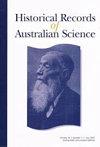CSIRO和巴布亚新几内亚土地研究1950-2000:第2部分:独立后
IF 0.2
4区 哲学
Q4 HISTORY & PHILOSOPHY OF SCIENCE
引用次数: 3
摘要
1975年巴布亚新几内亚(PNG)独立后,新政府直接与澳大利亚联邦科学与工业研究组织(CSIRO)接触,要求解决与粮食安全和农村农业有关的问题。随后,CSIRO与巴布亚新几内亚政府部门在现有调查信息的基础上开展了一系列合作研究项目,为巴布亚新几内亚提供了最早的国家级计算机资源信息系统之一,特别是在农业、林业、环境管理和规划方面得到了广泛应用。本历史回顾的第一部分讨论了1950 - 1975年期间CSIRO综合调查的演变、实施和结果,而第2部分描述了从调查中产生的后续研究项目,并于2000年结束。此外,CSIRO参与巴布亚新几内亚土地研究的遗留问题,与个别科学学科和其他相关技术领域的进展,以及组织内的操作挑战和结构变化有关。本文章由计算机程序翻译,如有差异,请以英文原文为准。
CSIRO and land research in Papua New Guinea 1950–2000: part 2: post-Independence
Following Papua New Guinea (PNG) Independence in 1975, the new administration approached Australia’s Commonwealth Scientific and Industrial Research Organisation (CSIRO) directly concerning the need to address issues related to food security and village-based agriculture. A subsequent series of collaborative research projects between CSIRO and PNG government departments built upon the existing survey information to provide PNG with one of the earliest national-level, computer-based resource information systems, with widespread applications, particularly in agriculture, forestry, environmental management and planning. Part 1 of this historical review discussed the evolution, conduct and outcomes of the CSIRO integrated surveys over the period 1950–75, while Part 2 describes the subsequent research projects that arose from the surveys and concluded in 2000. In addition, the legacy of CSIRO involvement in land research in PNG is examined in relation to advances made both within individual scientific disciplines and in other relevant technological fields, and to operational challenges and structural change within the organisation.
求助全文
通过发布文献求助,成功后即可免费获取论文全文。
去求助
来源期刊

Historical Records of Australian Science
HISTORY & PHILOSOPHY OF SCIENCE-
CiteScore
0.90
自引率
66.70%
发文量
22
期刊介绍:
Historical Records of Australian Science is a bi-annual journal that publishes two kinds of unsolicited manuscripts relating to the history of science, pure and applied, in Australia, New Zealand and the southwest Pacific.
Historical Articles–original scholarly pieces of peer-reviewed research
Historical Documents–either hitherto unpublished or obscurely published primary sources, along with a peer-reviewed scholarly introduction.
The first issue of the journal (under the title Records of the Australian Academy of Science), appeared in 1966, and the current name was adopted in 1980.
 求助内容:
求助内容: 应助结果提醒方式:
应助结果提醒方式:


